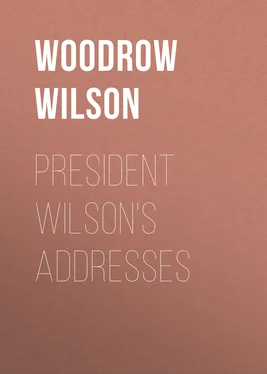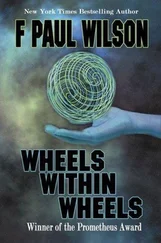Woodrow Wilson - President Wilson's Addresses
Здесь есть возможность читать онлайн «Woodrow Wilson - President Wilson's Addresses» — ознакомительный отрывок электронной книги совершенно бесплатно, а после прочтения отрывка купить полную версию. В некоторых случаях можно слушать аудио, скачать через торрент в формате fb2 и присутствует краткое содержание. Издательство: Иностранный паблик, Жанр: foreign_prose, История, foreign_edu, foreign_antique, на английском языке. Описание произведения, (предисловие) а так же отзывы посетителей доступны на портале библиотеки ЛибКат.
- Название:President Wilson's Addresses
- Автор:
- Издательство:Иностранный паблик
- Жанр:
- Год:неизвестен
- ISBN:нет данных
- Рейтинг книги:5 / 5. Голосов: 1
-
Избранное:Добавить в избранное
- Отзывы:
-
Ваша оценка:
- 100
- 1
- 2
- 3
- 4
- 5
President Wilson's Addresses: краткое содержание, описание и аннотация
Предлагаем к чтению аннотацию, описание, краткое содержание или предисловие (зависит от того, что написал сам автор книги «President Wilson's Addresses»). Если вы не нашли необходимую информацию о книге — напишите в комментариях, мы постараемся отыскать её.
President Wilson's Addresses — читать онлайн ознакомительный отрывок
Ниже представлен текст книги, разбитый по страницам. Система сохранения места последней прочитанной страницы, позволяет с удобством читать онлайн бесплатно книгу «President Wilson's Addresses», без необходимости каждый раз заново искать на чём Вы остановились. Поставьте закладку, и сможете в любой момент перейти на страницу, на которой закончили чтение.
Интервал:
Закладка:
But in spite of all these resemblances to older authors, Mr. Wilson gives proof in his style of a masterful independence. He is constantly determined to think for himself, to get to the bottom of his subject, and finally to express the matter in terms of his own personality. Especially is this evident in his early works, where he struggles manfully to be himself, even in the choice of words and phrases, weighing and analyzing the most current idioms and often making in them some thoughtful alteration the better to express his exact meaning. His literary training appears to have been almost wholly English. There are few traces in his writings of any classical reading or of any first-hand acquaintance with French, German, or Italian authors. And indeed in the substance of his thought I wonder if he is sufficiently hospitable to foreign ideas, especially to the vast body of comment on the French Revolution. I imagine few Continental authorities would agree with him in his comparatively low estimate of the importance of that great movement, which he seems to regard with almost unmitigated disapproval.
In Mr. Wilson's addresses and public letters concerning the War he re-affirms his principles and applies them with high confidence to the fateful problems of this time. His tone has become vastly deeper and sounder since he made his great decision, and from his Speech to Congress, on February 3, 1917, to his recent Baltimore appeal, it has rung true to every good impulse in the hearts of our people. His letter to the Pope is in every way his master-piece, in style, in temper, and in power of thought. He has led his country to the place it ought to occupy, by the side of that other English democracy whose institutions, ideals, and destiny are almost identical with our own, as he has demonstrated in the writings of half a lifetime. Let us hope there was prophetic virtue in a passage of his Constitutional Government , where, speaking of the relation between our several States and the Union that binds them together, he says they "may yet afford the world itself the model of federation and liberty it may in God's providence come to seek."
No one can rise from a perusal of the great mass of Mr. Wilson's writings without an almost oppressive sense of his unremitting and strenuous industry. From his senior year in college to the present day he has borne the anxieties and responsibilities of authorship. The work has been done with extreme conscientiousness in regard to accuracy and clearness of thinking and with sedulous care for justness and beauty of expression. It might well crown a life with honor. And when we remember the thousands of his college lectures and the hundreds of his miscellaneous addresses which have found no record in print, when we recall the labors of university administration which crowded upon him in middle life, when we consider the spectacle of his calm, prompt, orderly, and energetic performance of public duty in these latter years, our admiration for the literary artist is enhanced by our profound respect for the man. 1 1 A considerable part of this Introduction appeared originally as an article in The Princeton Alumni Weekly .
PRESIDENT WILSON'S ADDRESSES
FIRST INAUGURAL ADDRESS
[Delivered at the Capitol, in Washington, March 4, 1913.]
There has been a change of government. It began two years ago, when the House of Representatives became Democratic by a decisive majority. It has now been completed. The Senate about to assemble will also be Democratic. The offices of President and Vice-President have been put into the hands of Democrats. What does the change mean? That is the question that is uppermost in our minds to-day. That is the question I am going to try to answer, in order, if I may, to interpret the occasion.
It means much more than the mere success of a party. The success of a party means little except when the Nation is using that party for a large and definite purpose. No one can mistake the purpose for which the Nation now seeks to use the Democratic Party. It seeks to use it to interpret a change in its own plans and point of view. Some old things with which we had grown familiar, and which had begun to creep into the very habit of our thought and of our lives, have altered their aspect as we have latterly looked critically upon them, with fresh, awakened eyes; have dropped their disguises and shown themselves alien and sinister. Some new things, as we look frankly upon them, willing to comprehend their real character, have come to assume the aspect of things long believed in and familiar, stuff of our own convictions. We have been refreshed by a new insight into our own life.
We see that in many things that life is very great. It is incomparably great in its material aspects, in its body of wealth, in the diversity and sweep of its energy, in the industries which have been conceived and built up by the genius of individual men and the limitless enterprise of groups of men. It is great, also, very great, in its moral force. Nowhere else in the world have noble men and women exhibited in more striking forms the beauty and the energy of sympathy and helpfulness and counsel in their efforts to rectify wrong, alleviate suffering, and set the weak in the way of strength and hope. We have built up, moreover, a great system of government, which has stood through a long age as in many respects a model for those who seek to set liberty upon foundations that will endure against fortuitous change, against storm and accident. Our life contains every great thing, and contains it in rich abundance.
But the evil has come with the good, and much fine gold has been corroded. With riches has come inexcusable waste. We have squandered a great part of what we might have used, and have not stopped to conserve the exceeding bounty of nature, without which our genius for enterprise would have been worthless and impotent, scorning to be careful, shamefully prodigal as well as admirably efficient. We have been proud of our industrial achievements, but we have not hitherto stopped thoughtfully enough to count the human cost, the cost of lives snuffed out, of energies overtaxed and broken, the fearful physical and spiritual cost to the men and women and children upon whom the dead weight and burden of it all has fallen pitilessly the years through. The groans and agony of it all had not yet reached our ears, the solemn, moving undertone of our life, coming up out of the mines and factories and out of every home where the struggle had its intimate and familiar seat. With the great Government went many deep secret things which we too long delayed to look into and scrutinize with candid, fearless eyes. The great Government we loved has too often been made use of for private and selfish purposes, and those who used it had forgotten the people.
At last a vision has been vouchsafed us of our life as a whole. We see the bad with the good, the debased and decadent with the sound and vital. With this vision we approach new affairs. Our duty is to cleanse, to reconsider, to restore, to correct the evil without impairing the good, to purify and humanize every process of our common life without weakening or sentimentalizing it. There has been something crude and heartless and unfeeling in our haste to succeed and be great. Our thought has been "Let every man look out for himself, let every generation look out for itself," while we reared giant machinery which made it impossible that any but those who stood at the levers of control should have a chance to look out for themselves. We had not forgotten our morals. We remembered well enough that we had set up a policy which was meant to serve the humblest as well as the most powerful, with an eye single to the standards of justice and fair play, and remembered it with pride. But we were very heedless and in a hurry to be great.
Читать дальшеИнтервал:
Закладка:
Похожие книги на «President Wilson's Addresses»
Представляем Вашему вниманию похожие книги на «President Wilson's Addresses» списком для выбора. Мы отобрали схожую по названию и смыслу литературу в надежде предоставить читателям больше вариантов отыскать новые, интересные, ещё непрочитанные произведения.
Обсуждение, отзывы о книге «President Wilson's Addresses» и просто собственные мнения читателей. Оставьте ваши комментарии, напишите, что Вы думаете о произведении, его смысле или главных героях. Укажите что конкретно понравилось, а что нет, и почему Вы так считаете.












